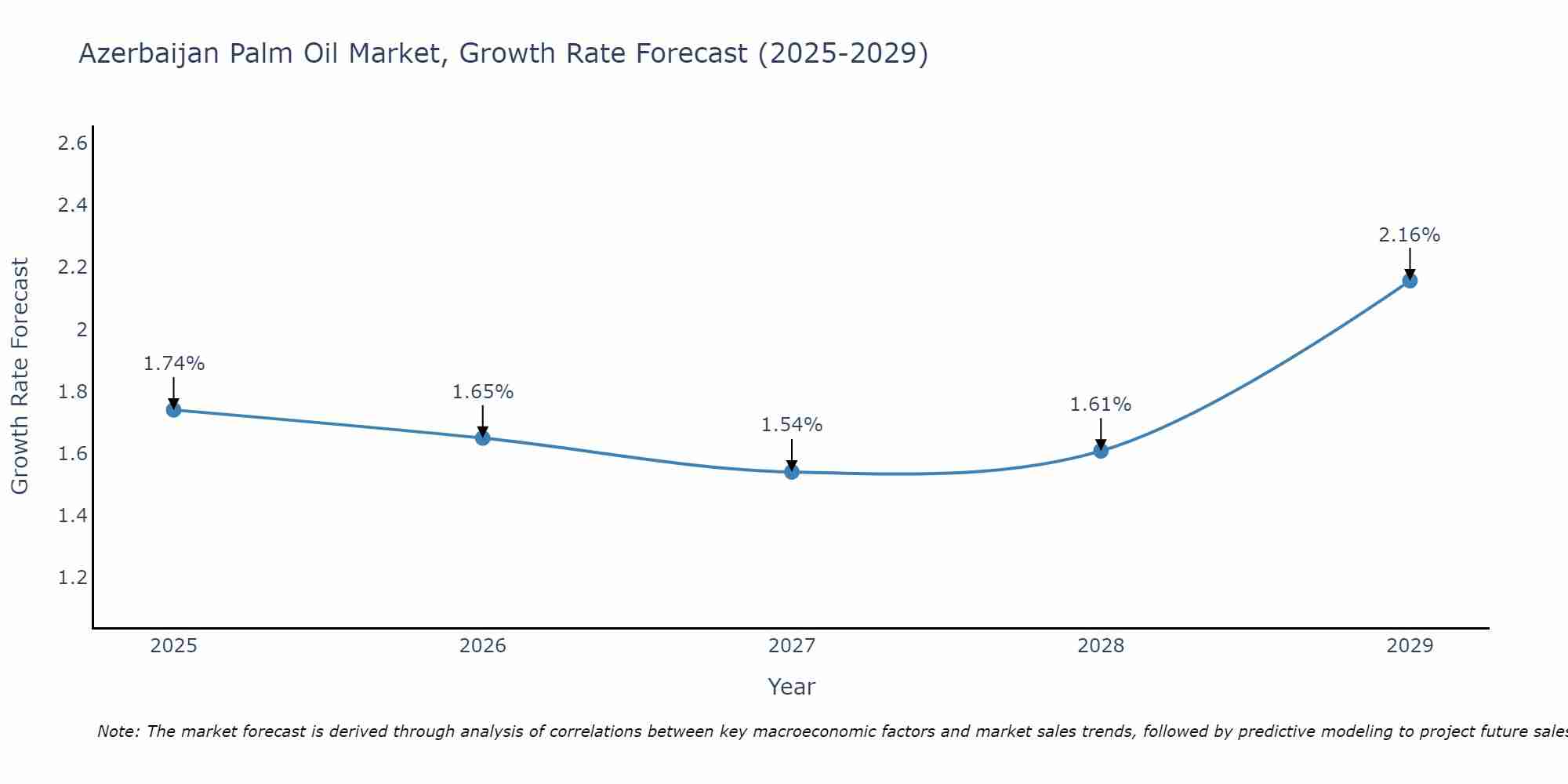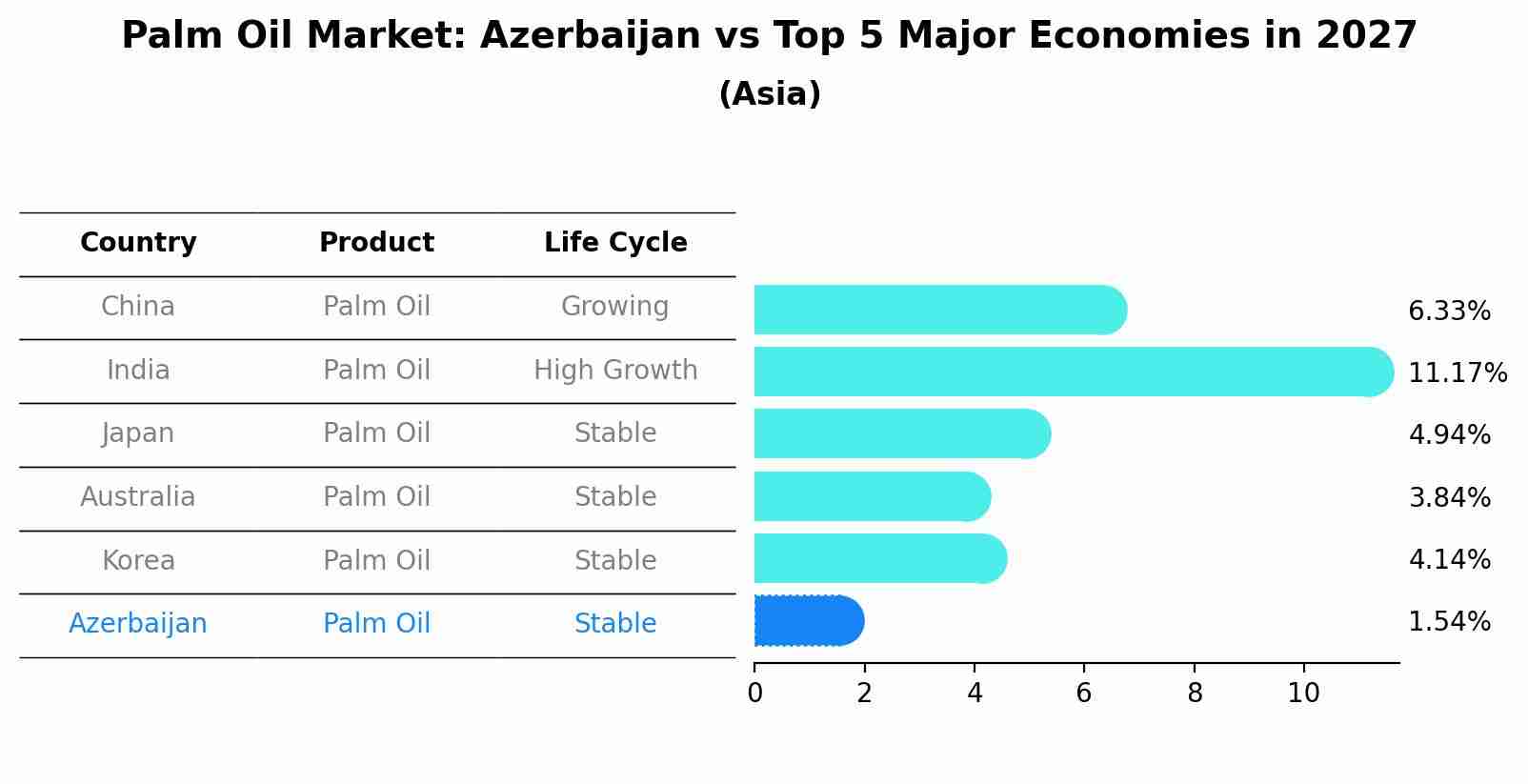Azerbaijan Palm Oil Market Outlook | Companies, Analysis, Forecast, Value, Revenue, Size, COVID-19 IMPACT, Share, Growth, Trends & Industry
| Product Code: ETC383817 | Publication Date: Aug 2022 | Updated Date: Jul 2025 | Product Type: Market Research Report | |
| Publisher: 6Wresearch | Author: Ravi Bhandari | No. of Pages: 75 | No. of Figures: 35 | No. of Tables: 20 |
Azerbaijan Palm Oil Market Size Growth Rate
The Azerbaijan Palm Oil Market is projected to witness mixed growth rate patterns during 2025 to 2029. From 1.74% in 2025, the growth rate steadily ascends to 2.16% in 2029.

Palm Oil Market: Azerbaijan vs Top 5 Major Economies in 2027 (Asia)
By 2027, Azerbaijan's Palm Oil market is forecasted to achieve a stable growth rate of 1.54%, with China leading the Asia region, followed by India, Japan, Australia and South Korea.

Azerbaijan Palm Oil Market Synopsis
The Azerbaijan palm oil market is experiencing steady growth driven by increasing demand from the food industry and the rising disposable income of consumers. Palm oil is widely used in cooking, baking, and food processing due to its versatility and affordability. The market is dominated by imported palm oil products, primarily sourced from Malaysia and Indonesia. However, there is a growing trend towards sustainable and certified palm oil products in Azerbaijan, in line with global efforts for environmental conservation and ethical sourcing. The market is also influenced by government regulations and trade policies, which impact pricing and availability. Overall, the Azerbaijan palm oil market is poised for further expansion, driven by changing consumer preferences, economic development, and evolving industry standards.
Azerbaijan Palm Oil Market Trends
Currently, the Azerbaijan Palm Oil Market is witnessing a steady growth in demand due to the increasing awareness of the health benefits associated with palm oil consumption. The market is also influenced by the growing food industry in the region, which is driving the demand for palm oil as a key ingredient in various food products. Additionally, the versatility of palm oil in applications such as cooking oil, margarine, and bakery products is further fueling its popularity among consumers. However, sustainability concerns and efforts to promote environmentally friendly practices in the palm oil industry are also shaping the market trends in Azerbaijan, with consumers showing a preference for sustainably sourced palm oil products. Overall, the market is poised for continued growth and is likely to see further developments in sustainable sourcing practices and product innovations.
Azerbaijan Palm Oil Market Challenges
In the Azerbaijan Palm Oil Market, several challenges are faced including high import costs due to the country`s landlocked geography, limited domestic production capabilities, and fluctuations in global palm oil prices. Additionally, there is a lack of consumer awareness and demand for sustainably sourced palm oil products, which can hinder market growth. Regulatory barriers and competition from other edible oils in the market further add complexity to the industry. Despite efforts to promote palm oil usage in various industries such as food processing and cosmetics, the market still struggles to establish a solid foothold due to these challenges. Companies operating in this market need to navigate these obstacles effectively to capitalize on the potential opportunities in Azerbaijan`s palm oil sector.
Azerbaijan Palm Oil Market Investment Opportunities
The Azerbaijan palm oil market presents potential investment opportunities due to increasing demand driven by the country`s growing population and expanding food processing industry. Investors can explore opportunities in palm oil production, processing, and distribution to capitalize on the rising consumption trends. Additionally, investing in technology and sustainable practices for palm oil cultivation can provide long-term growth prospects while aligning with environmental regulations. Collaboration with local farmers and stakeholders can also enhance market access and supply chain efficiency. Overall, the Azerbaijan palm oil market offers potential for investors to contribute to the country`s economic development while meeting the demand for this essential commodity.
Jordan Agar Market Government Policies
The Azerbaijan government has implemented policies to regulate the import and use of palm oil in the country. In 2019, Azerbaijan introduced a special tax on the import of palm oil to protect local producers and promote domestic production. Additionally, the government has set maximum limits on the use of trans fats in food products, including those containing palm oil, in an effort to promote healthier eating habits among the population. These policies aim to strike a balance between supporting local industries and ensuring the health and well-being of Azerbaijani consumers by regulating the use of palm oil in food products.
Azerbaijan Palm Oil Market Future Outlook
The future outlook for the Azerbaijan Palm Oil Market appears positive, with steady growth expected in the coming years. Factors contributing to this outlook include increasing consumer demand for palm oil due to its versatile applications in food products, cosmetics, and biofuels. Additionally, the growing awareness of the health benefits of sustainable palm oil production methods and certifications is likely to drive market expansion. Government initiatives to support domestic palm oil production and investments in the agricultural sector are also anticipated to boost market growth. However, challenges such as fluctuating palm oil prices, environmental concerns, and competition from other vegetable oils could impact the market dynamics. Overall, the Azerbaijan Palm Oil Market is poised for growth, driven by rising demand and supportive industry trends.
Key Highlights of the Report:
- Azerbaijan Palm Oil Market Outlook
- Market Size of Azerbaijan Palm Oil Market, 2021
- Forecast of Azerbaijan Palm Oil Market, 2031
- Historical Data and Forecast of Azerbaijan Palm Oil Revenues & Volume for the Period 2018 - 2031
- Azerbaijan Palm Oil Market Trend Evolution
- Azerbaijan Palm Oil Market Drivers and Challenges
- Azerbaijan Palm Oil Price Trends
- Azerbaijan Palm Oil Porter's Five Forces
- Azerbaijan Palm Oil Industry Life Cycle
- Historical Data and Forecast of Azerbaijan Palm Oil Market Revenues & Volume By Nature for the Period 2018 - 2031
- Historical Data and Forecast of Azerbaijan Palm Oil Market Revenues & Volume By Organic for the Period 2018 - 2031
- Historical Data and Forecast of Azerbaijan Palm Oil Market Revenues & Volume By Conventional for the Period 2018 - 2031
- Historical Data and Forecast of Azerbaijan Palm Oil Market Revenues & Volume By Product for the Period 2018 - 2031
- Historical Data and Forecast of Azerbaijan Palm Oil Market Revenues & Volume By CPO for the Period 2018 - 2031
- Historical Data and Forecast of Azerbaijan Palm Oil Market Revenues & Volume By RBD Palm Oil for the Period 2018 - 2031
- Historical Data and Forecast of Azerbaijan Palm Oil Market Revenues & Volume By Palm Kernel Oil for the Period 2018 - 2031
- Historical Data and Forecast of Azerbaijan Palm Oil Market Revenues & Volume By Fractionated Palm Oil for the Period 2018 - 2031
- Historical Data and Forecast of Azerbaijan Palm Oil Market Revenues & Volume By End-use for the Period 2018 - 2031
- Historical Data and Forecast of Azerbaijan Palm Oil Market Revenues & Volume By Food & Beverage for the Period 2018 - 2031
- Historical Data and Forecast of Azerbaijan Palm Oil Market Revenues & Volume By Personal Care & Cosmetics for the Period 2018 - 2031
- Historical Data and Forecast of Azerbaijan Palm Oil Market Revenues & Volume By Biofuel & Energy for the Period 2018 - 2031
- Historical Data and Forecast of Azerbaijan Palm Oil Market Revenues & Volume By Pharmaceuticals for the Period 2018 - 2031
- Historical Data and Forecast of Azerbaijan Palm Oil Market Revenues & Volume By Others for the Period 2018 - 2031
- Azerbaijan Palm Oil Import Export Trade Statistics
- Market Opportunity Assessment By Nature
- Market Opportunity Assessment By Product
- Market Opportunity Assessment By End-use
- Azerbaijan Palm Oil Top Companies Market Share
- Azerbaijan Palm Oil Competitive Benchmarking By Technical and Operational Parameters
- Azerbaijan Palm Oil Company Profiles
- Azerbaijan Palm Oil Key Strategic Recommendations
Frequently Asked Questions About the Market Study (FAQs):
- Single User License$ 1,995
- Department License$ 2,400
- Site License$ 3,120
- Global License$ 3,795
Search
Thought Leadership and Analyst Meet
Our Clients
Related Reports
- Afghanistan Rocking Chairs And Adirondack Chairs Market (2026-2032) | Size & Revenue, Competitive Landscape, Share, Segmentation, Industry, Value, Outlook, Analysis, Trends, Growth, Forecast, Companies
- Afghanistan Apparel Market (2026-2032) | Growth, Outlook, Industry, Segmentation, Forecast, Size, Companies, Trends, Value, Share, Analysis & Revenue
- Canada Oil and Gas Market (2026-2032) | Share, Segmentation, Value, Industry, Trends, Forecast, Analysis, Size & Revenue, Growth, Competitive Landscape, Outlook, Companies
- Germany Breakfast Food Market (2026-2032) | Industry, Share, Growth, Size, Companies, Value, Analysis, Revenue, Trends, Forecast & Outlook
- Australia Briquette Market (2025-2031) | Growth, Size, Revenue, Forecast, Analysis, Trends, Value, Share, Industry & Companies
- Vietnam System Integrator Market (2025-2031) | Size, Companies, Analysis, Industry, Value, Forecast, Growth, Trends, Revenue & Share
- ASEAN and Thailand Brain Health Supplements Market (2025-2031) | Strategy, Consumer Insights, Analysis, Investment Trends, Opportunities, Growth, Size, Share, Industry, Revenue, Segments, Value, Segmentation, Supply, Forecast, Restraints, Outlook, Competition, Drivers, Trends, Demand, Pricing Analysis, Competitive, Strategic Insights, Companies, Challenges
- ASEAN Bearings Market (2025-2031) | Strategy, Consumer Insights, Analysis, Investment Trends, Opportunities, Growth, Size, Share, Industry, Revenue, Segments, Value, Segmentation, Supply, Forecast, Restraints, Outlook, Competition, Drivers, Trends, Demand, Pricing Analysis, Competitive, Strategic Insights, Companies, Challenges
- Europe Flooring Market (2025-2031) | Outlook, Share, Industry, Trends, Forecast, Companies, Revenue, Size, Analysis, Growth & Value
- Saudi Arabia Manlift Market (2025-2031) | Outlook, Size, Growth, Trends, Companies, Industry, Revenue, Value, Share, Forecast & Analysis
Industry Events and Analyst Meet
Whitepaper
- Middle East & Africa Commercial Security Market Click here to view more.
- Middle East & Africa Fire Safety Systems & Equipment Market Click here to view more.
- GCC Drone Market Click here to view more.
- Middle East Lighting Fixture Market Click here to view more.
- GCC Physical & Perimeter Security Market Click here to view more.
6WResearch In News
- Doha a strategic location for EV manufacturing hub: IPA Qatar
- Demand for luxury TVs surging in the GCC, says Samsung
- Empowering Growth: The Thriving Journey of Bangladesh’s Cable Industry
- Demand for luxury TVs surging in the GCC, says Samsung
- Video call with a traditional healer? Once unthinkable, it’s now common in South Africa
- Intelligent Buildings To Smooth GCC’s Path To Net Zero


















